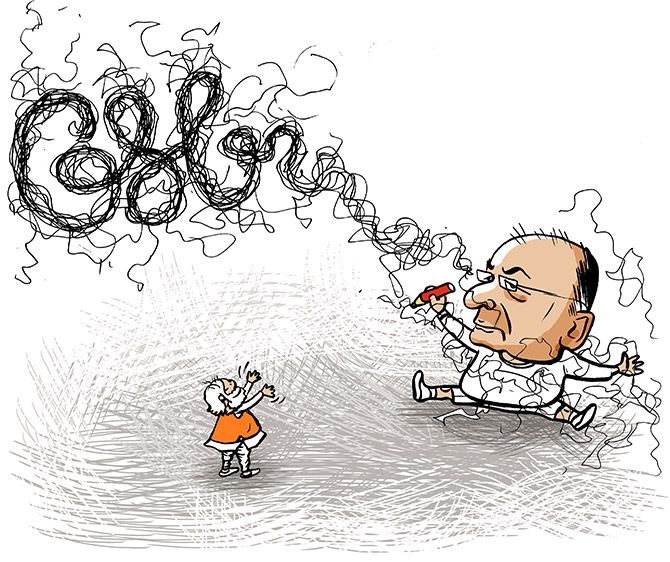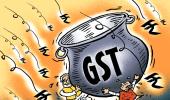'There is something fundamentally wrong with the GST -- whether be it the rates, compliance, or the GST Network itself.'
Illustration: Dominic Xavier/Rediff.com

Exclusion of energy, real estate, and power are leading to cascading of taxes, and need to be brought under the goods and services tax (GST), Punjab Finance Minister Manpreet Singh Badal tells Dilasha Seth.
What are the key concerns that you have raised with the Centre on the GST?
We were told once the GST was implemented, India's gross domestic product would go up by 2 per cent, but the opposite has happened.
There is something fundamentally wrong with the GST -- whether be it the rates, compliance, or the GST Network (GSTN) itself.
We have gone in for a reform measure that is half-baked. The Indian GST rate is the highest in the world.
Most countries start with a uniform GST rate of a single digit -- at best, below 15 per cent; at worst, 18 to 20 per cent.
GST rates of 40 per cent are unheard of anywhere in the world.
Most of the issues on rates and compliance may get addressed in the Council meeting on Friday. Why is the Congress raising them now?
It has been five months since the GST roll-out.
It is now that the government has woken up to the issues we have been talking about. It is too little, too late.
It is not a question of the Congress or the BJP, but a question of the livelihood of millions.
There has been a change of heart at the Centre. I do not know whether it has to do with the elections, but it needs to be done in the interest of the nation.
You also spoke about including real estate, petrol, and electricity under the GST. Will you effectively raise it in the meeting on Friday?
One has to bring petroleum, real estate, and electricity under the GST.
This has, in fact, led to a lot of cascading of taxes across the board. For GST to be effective, all items must be subsumed.
At least 50 per cent revenue has been kept out of the GST. There needs to be a discussion on this.
Compliance is another issue you have strongly raised. What is the big demand?
The requirement of matching nearly 3,500 million invoices every month with a possible 20 per cent mismatch will require additional working capital of close to Rs 1 lakh crore.
Companies are not getting their input credit on time. Compliance should be made easier.
The GSTN needs to be strengthened. The invoice matching glitches should be rectified.
We hope to find a solution to that in today's (Friday's) meeting.












 © 2025
© 2025